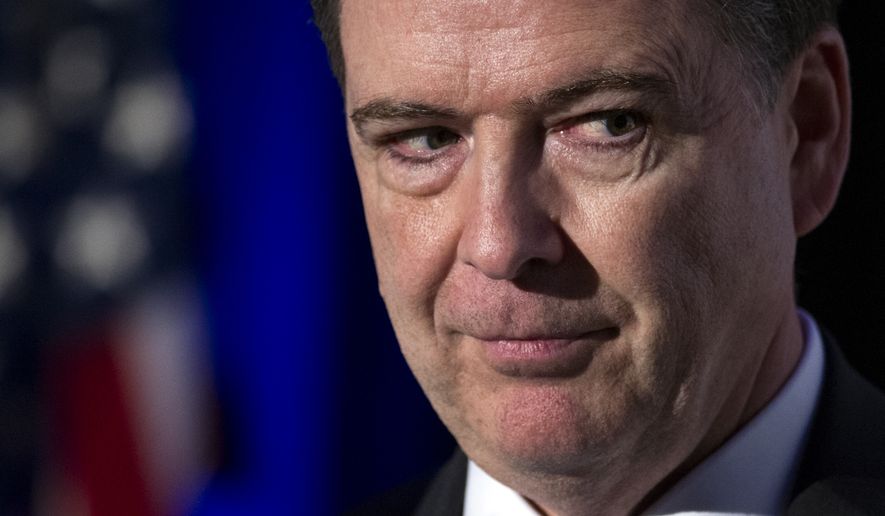Fired FBI Director James Comey portrays himself as a victim because of the way Donald Trump reacted when he told the president-elect there was an allegation he spent time with prostitutes in Moscow.
In his memoir, “A Higher Loyalty,” released on Tuesday, Mr. Comey describes a five-minute one-on-one meeting at Trump Tower during which he relayed a salacious item––he termed it “material”–– in the infamous dossier.
Mr. Trump later telephoned him, after BuzzFeed posted the entire 35-pages, to again deny the episode which supposedly involved “golden showers” in a Ritz Carleton hotel room.
“I went to find my chief of staff, Jim Rybicki, to tell him the world had gone crazy and I was caught in the middle of it,” writes Mr. Comey.
Mr. Comey said he “didn’t care about” the subject matter.
What Mr. Comey did not tell the president that Jan. 6, 2017 is the source for the craziness: the Democratic Party had funded the dossier sourced to the Kremlin.
Mr. Comey knew at the time that the Democratic National Committee and the Hillary Clinton campaign financed the gossipy memos compiled by former British spy Christoper Steele. Mr. Steele was hired by Fusion GPS which, with the author, was using his lists of unverified Trump-Russia collusion charges to try to destroy the Trump candidacy and spark an FBI investigation.
On the latter, Mr. Steele and Fusion were successful. As Mr. Comey spoke on Jan. 6, the FBI was preparing to use the dossier for a second of four court-ordered wiretaps on Trump campaign volunteer Carter Page.
But Mr. Comey kept Mr. Trump in the dark about how the salacious tidbit was pure opposition party research designed to destroy him.
Trump supporters say today if Mr. Comey had been more forthcoming the president would have known from the start that the prostitute story was partisan and not sourced to some type of intelligence report.
“I stared out at the monuments and wondered what had happened to me and our country that the FBI director was talking about this with our incoming president,” Mr. Comey writes. “Having delivered his defense on a subject I didn’t care about, for the second time, the president-elect ended the call.”
Mr. Comey offers no criticism of Democrats for financing and distributing such a smut-filled document.
Instead, he focuses his criticism on Mr. Trump for the way he reacted.
In the follow-up phone call, Mr. Comey had another chance to explain the dossier’s political motivations but did not.
“I explained that the dossier was not a government document,” he says “It had been compiled by private parties and then given to many people, including in Congress and the press. The FBI hadn’t asked that it be created or paid for it to be created. The document was not classified and not a government document, so it wasn’t really correct that it had been ‘leaked.’”
Mr. Comey also left out the part about Mr. Steele and the fact the FBI planned to begin paying him to continue to investigate Mr. Trump. The FBI stopped the deal after learning Mr. Steele broke their agreement and went to the news media.
“I added that one of the FBI’s jobs is to protect the presidency from any kind of coercion, and, whether or not the allegations were true, it was important that he know Russians might be saying such things,” Mr. Comey says. “I stressed that we did not want to keep information from him, particularly given that the press was about to report it.”
Writing about a limo trip to Capitol Hill, Mr. Comey again painted himself as a man unfairly besieged.
“Then the moment passed, and we pulled up to the U.S. Capitol to talk about Putin and Trump and collusion allegations and secret dossiers and who knew what else. It was just another high-pressure moment in what was one of the craziest, most consequential, and even educational periods of my—and, some might say, the country’s—life. And more than once I found myself thinking that same question: How on earth did I end up here?”
Rep. Devin Nunes, California Republican and chairman of the House Permanent Select Committee on Intelligence, uncover the dossier’s funding sources through subpoenas late last year.
• Rowan Scarborough can be reached at rscarborough@washingtontimes.com.




Please read our comment policy before commenting.